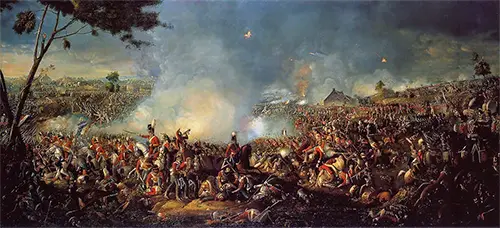Arthur Wellesley, the Duke of Wellington
In 1813, Wellington led his men north, in an increasing series of flanking maneuvers that convinced French troops to abandon Madrid and Burgos. Wellington's troops, in the Battle of Vittoria, defeated the troops of King Joseph Bonaparte, forcing the monarch to flee; for that, Wellington was promoted to field marshal. 
Wellington's force pushed French troops under Soult and others further and further north and into France, winning at the Pyrenees and Bidassoa and Nivelle. After yet another allied victory, at Toulouse, Soult, having heard of Bonaparte's abdication, negotiated a cease-fire. In May 1814, Wellington was made a duke. Offered the command of troops in America (to fight the War of 1812), Wellington convinced Prime Minister Robert Jenkinson to send him instead to Vienna, there, as the Ambassador to France, to contribute to the postwar Congress of Vienna. He served in that capacity until Bonaparte returned, in the Hundred Days. Wellington assumed command of a group of troops from Germany, the Netherlands, and the U.K. Allied with that force was a large group of Prussian troops under Generalfeldmarschall Gebhard von Blücher. Though Bonaparte tried to keep the two forces apart, they eventually united, securing Bonaparte's final Wellington returned to politics three years later, accepting the appointment as Master-General of the Ordnance in December 1818. The following year, he was Governor of Plymouth. In 1827, he was named Commander-in-Chief of the Army and Constable of the Tower of London. He achieved the pinnacle of U.K. politics in 1828 when he became Prime Minister. He held that position for only two years, however. Highlights of his reign were the Catholic Relief Act 1829, which largely advanced Catholic Emancipation, and the establishment of King's College London, of which he played a large part. For the former, Wellington had threatened to resign if King George IV didn't give the Royal Assent. Another notable achievement came in 1829, when Robert Peel established the London Metropolitan Police Service. Wellington's nickname of the "Iron Duke" came from this time in his life, when, despite his previous military successes, achieved a high degree of unpopularity. In one case, Wellington and the Earl of Winchilsea fought a duel; both survived. A vote of no confidence in November 1830 ended his tenure as Prime Minister. He continued as a major figure in the Tory Party and spoke out and worked against the passage of the Reform Act 1832, which increased the number of available voters in the United Kingdom while also making voting more equitable. In 1834, the Tories gained power and Wellington refused an offer to again be Prime Minister. Instead, Robert Peel took over, naming Wellington Foreign Secretary. He was Leader of the House of Lords from 1828 to 1846. 
He retired from politics after that. He was still Commander-in-Chief of the Army and, during the Revolutions of 1848, helped organize a defense force for London. Among his other assignments were as Lord Warden of the Cinque Ports and a stint as the Chief Ranger and Keeper of Hyde Park and St. James's Park. His wife had died in 1831. He himself died at Walmer Castle, in Deal, on Sept. 14, 1852; he was 83. Many places and things are named after the Duke of Wellington, including the capital of New Zealand, a public school in Berkshire, and a kind of boots, styled after the Hessian model that he was fond of wearing. First page > Early Years > Page 1, 2 |
|
Social Studies for Kids
copyright 2002–2025
David White



 defeat
defeat 
